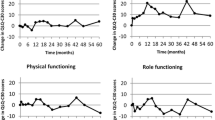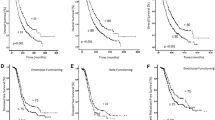Abstract
Purpose
Quality of life (QoL) is an important factor in patient care. This analysis is focused on QoL before and after radio(chemo)therapy in patients with thoracic carcinomas, as well as on its influence on clinical follow-up and survival, and the correlation with treatment-related toxicities.
Materials and methods
The analysis included 81 patients with intrathoracic carcinoma receiving radio(chemo)therapy. For analysis of QoL, the European Organisation for Research and Treatment of Cancer Quality of Life Questionnaire (EORTC QLQ-C30) and the lung cancer-specific supplement (EORTC QLQ-LC13) were used. QoL data were collected before radiation treatment (RT), and 6 weeks, 12 weeks, 6 months, and 12 months after RT. Other factors were additionally analyzed, including clinical outcome, survival, and side effects.
Results
The functional scales showed maximum values or at least a recovery 12 weeks after RT. Symptoms with a high mean symptom score (> 40) at all appointments were fatigue, dyspnea, and coughing. Insomnia, peripheral neuropathy, appetite loss, dyspnea (from QLQ-LC13), and all pain parameters had an intermediate mean score (10–40). There were low mean scores of < 10 for nausea and vomiting, diarrhea, sore mouth, and hemoptysis. There was a significant correlation between clinical dysphagia and radiation pneumonitis with the associated symptom scales. None of the QoL scores had a significant influence on local and distant control or survival.
Conclusion
12 weeks after RT the QLQ-C30 functional scales show the highest scores or at least a temporary recovery. The symptom scales accurately reflect the common symptoms and treatment-related toxicities. QoL did not prove to be a significant predictor for local and distant control or survival.
Zusammenfassung
Zielsetzung
Die Lebensqualität (QoL) ist ein entscheidender Faktor in der Patientenversorgung. In der vorliegenden Untersuchung lag der Fokus auf der QoL vor und nach Radio(chemo)therapie von Patienten mit thorakalen Tumoren sowie deren Einfluss auf das klinische Ergebnis, das Überleben und die Korrelation mit therapieinduzierten Nebenwirkungen.
Material und Methoden
Analysiert wurden 81 Patienten mit thorakalen Tumoren, die mittels Radio(chemo)therapie behandelt wurden. Zur Objektivierung der QoL wurden der EORTC QLQ-C30 und der EORTC QLQ-LC13 (European Organisation for Research and Treatment of Cancer Quality of Life Questionnaire) verwendet. QoL-Daten wurden vor Strahlentherapie (RT) sowie 6 Wochen, 12 Wochen, 6 Monate und 1 Jahr nach RT gesammelt. Zusätzlich wurden weitere Faktoren wie das klinische Ergebnis, Überleben und Nebenwirkungen analysiert.
Ergebnisse
Sämtliche Funktionsskalen zeigten ein Maximum oder zumindest eine Erholung 12 Wochen nach RT. Symptome mit hohem durchschnittlichen Symptomscore (> 40) zu allen Untersuchungszeitpunkten waren Fatigue, Dyspnoe und Husten. Schlaflosigkeit, periphere Neuropathie, Appetitverlust, Dyspnoe (aus QLQ-LC13) und alle Schmerzparameter zeigten durchschnittlich eine mittlere Punktzahl (10–40). Niedrige durchschnittliche Punktzahlen (< 10) hatten Übelkeit und Erbrechen, Diarrhö, Wunden im Mundbereich und Hämoptysis. Keine signifikante Korrelation mit den zugehörigen Symptomskalen bestand zwischen klinisch vorhandener Dysphagie und Pneumonitis. Kein QoL-Parameter hatte signifikanten Einfluss auf klinische Kontrolle oder Gesamtüberleben.
Schlussfolgerung
Die besten Werte oder zumindest eine Erholung der Funktionsskalen zeigen sich 12 Wochen nach RT. Die Symptomskalen spiegeln die häufigsten tumor- oder therapiebezogenen Symptome wieder. Die QoL hat keinen signifikanten Einfluss auf klinische Kontrolle oder Gesamtüberleben.




Similar content being viewed by others

References
Derogar M, Lagergren P (2012) Health-related quality of life among 5‑year survivors of esophageal cancer surgery: a prospective population-based study. J Clin Oncol 30(4):413–418
Sloan JA, Zhao X, Novotny PJ, Wampfler J, Garces Y, Clark MM et al (2012) Relationship between deficits in overall quality of life and non-small-cell lung cancer survival. J Clin Oncol 30(13):1498–1504
Movsas B, Moughan J, Sarna L, Langer C, Werner-Wasik M, Nicolaou N et al (2009) Quality of life supersedes the classic prognosticators for long-term survival in locally advanced non-small-cell lung cancer: an analysis of RTOG 9801. J Clin Oncol 27(34):5816–5822
Rumpold T, Lütgendorf-Caucig C, Jagsch R, Dieckmann K, Watzke H, Pötter R et al (2015) Information preferences regarding cure rates and prognosis of Austrian patients with advanced lung cancer. Strahlenther Onkol 191(7):549–556
Tribius S, Raguse M, Voigt C, Münscher A, Gröbe A, Petersen C et al (2015) Residual deficits in quality of life one year after intensity-modulated radiotherapy for patients with locally advanced head and neck cancer: Results of a prospective study. Strahlenther Onkol 191(6):501–510
Maurer J, Schäfer C, Maurer O, Kölbl O (2012) Anxiety and depression in cancer patients during the course of radiotherapy treatment. Strahlenther Onkol 188(10):940–945
Arrieta Ó, Angulo LP, Núñez-Valencia C, Dorantes-Gallareta Y, Macedo EO, Martínez-López D et al (2012) Association of depression and anxiety on quality of life, treatment adherence, and prognosis in patients with advanced non-small cell lung cancer. Ann Surg Oncol 20(6):1941–1948
Akin S, Can G, Aydiner A, Ozdilli K, Durna Z (2010) Quality of life, symptom experience and distress of lung cancer patients undergoing chemotherapy. Eur J Oncol Nurs 14(5):400–409
Blazeby JM, Brookes ST, Alderson D (2001) The prognostic value of quality of life scores during treatment for oesophageal cancer. BMJ 49(2):227–230
Braun DP, Gupta D, Staren ED (2011) Quality of life assessment as a predictor of survival in non-small cell lung cancer. BMC Cancer 11(1):353
Hallqvist A, Bergman B, Nyman J (2012) Health related quality of life in locally advanced NSCLC treated with high dose radiotherapy and concurrent chemotherapy or cetuximab – pooled results from two prospective clinical trials. Radiother Oncol 104(1):39–44
Gupta D, Braun DP, Staren ED (2012) Association between changes in quality of life scores and survival in non-small cell lung cancer patients. Eur J Cancer Care (Engl) 21(5):614–622
Coates A, Porzsolt F, Osoba D (1997) Quality of life in oncology practice: prognostic value of EORTC QLQ-C30 scores in patients with advanced malignancy. Eur J Cancer 33(7):1025–1030
Montazeri A, Milroy R, Hole D, McEwen J, Gillis CR (2001) Quality of life in lung cancer patients. Lung Cancer 31(2–3):233–240
Ganz PA, Lee JJ, Siau J (1991) Quality of life assessment. An independent prognostic variable for survival in lung cancer. Cancer 67(12):3131–3135
Maione P, Perrone F, Gallo C, Manzione L, Piantedosi F, Barbera S et al (2005) Pretreatment quality of life and functional status assessment significantly predict survival of elderly patients with advanced non-small-cell lung cancer receiving chemotherapy: a prognostic analysis of the multicenter Italian lung cancer in the elderly study. J Clin Oncol 23(28):6865–6872
Aaronson NK, Ahmedzai S, Bergman B, Bullinger M, Cull A, Duez NJ et al (1993) The European Organisation for Research and Treatment of Cancer QLQ-C30: A quality-of-life instrument for use in international clinical trials in oncology. J Natl Cancer Inst 85:365–376
Bergman B, Aaronson NK, Ahmedzai S, Kaasa S, Sullivan M (1994) The EORTC QLQ-LC13: a modular supplement to the EORTC core quality of life questionnaire (QLQ-C30) for use in lung cancer clinical trials. Eur J Cancer 30(5):635–642
Fayers PM, Aaronson NK, Bjordal K, Groenvold M, Curran D, Bottomley A, on behalf of the EORTC Quality of Life Group (2001) The EORTC QLQ-C30 Scoring Manual, 3rd edn. Published by: European Organisation for Research and Treatment of Cancer, Brussels.
Schröder C, Blank E, Sidow D, Engenhart-Cabillic R, Buchali A (2015) Is there a future for 74 Gy radiation treatment of NSCLC after RTOG 0617? A comparison of the RTOG study results with our own department’s 74 Gy NSCLC cohort. J Cancer Ther 06(08):642–647
Author information
Authors and Affiliations
Corresponding author
Ethics declarations
Conflict of interest
C. Schröder, R. Engenhart-Cabillic, H. Vorwerk, M. Schmidt, W. Huhnt, E. Blank, D. Sidow, and A. Buchali declare that they have no competing interests.
Ethical standards
All procedures followed were in accordance with the ethical standards of the responsible committee on human experimentation (institutional and national) and with the Helsinki Declaration of 1975 (in its most recently amended version). Informed consent was obtained from all patients included in the study.
Rights and permissions
About this article
Cite this article
Schröder, C., Engenhart-Cabillic, R., Vorwerk, H. et al. Patient’s quality of life after high-dose radiation therapy for thoracic carcinomas. Strahlenther Onkol 193, 132–140 (2017). https://doi.org/10.1007/s00066-016-1068-7
Received:
Accepted:
Published:
Issue Date:
DOI: https://doi.org/10.1007/s00066-016-1068-7



